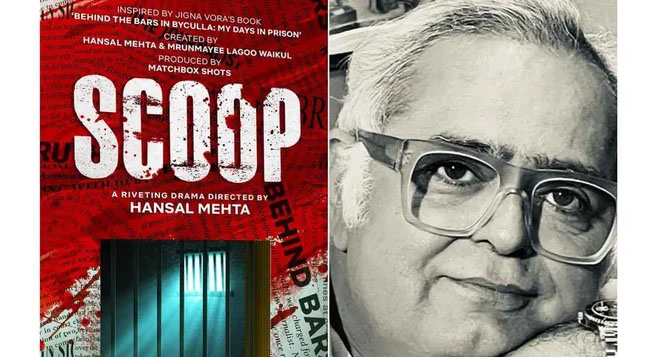Hansal Mehta’s next offering in the long storytelling format is ‘Scoop’, a series he describes as “a cautionary tale for the future”.
The director has frequently referred to himself as a “chronicler of our times,” thanks to social dramas set in contemporary history such as ‘Shahid’ and ‘Aligarh’, and ‘Scoop’, his next web series following the superhit ‘Scam 1992: A Harshad Mehta Story’, is another such story.
“There is no such thing as a good or bad time to tell a story. The time to tell a story is when you feel compelled to do so. The right time is when a filmmaker feels compelled to tell a story,” Mehta said in an interview to PTI.
When asked why he wanted to release this series, Mehta added, “I felt compelled.”
‘Scoop’ follows Karishma Tanna’s Jagruti Pathak, a star crime reporter at a Mumbai newspaper, who makes headlines after she is accused of murdering her rival Jaideb Sen (Prosenjit Chatterjee).
“We’re talking about our times in this (series), and it’s also a cautionary tale. It’s impossible to predict when the reporter will become the reported. This is a cautionary tale for the future in many ways,” Mehta told PTI.
Jigna Vora’s biographical book ‘Behind the Bars in Byculla: My Days in Prison’ inspired the upcoming Netflix show. Mehta and Mrunmayee Lagoo Waikul (writer of ‘Thappad’) collaborated on the project.
Matchbox Shots producer Sarita Patil, according to Mehta, called him and told him about Vora’s book. The filmmaker was ready to begin work on ‘Behind the Bars in Byculla: My Days in Prison’ after reading the first two chapters.
“I saw this as an opportunity to do something bigger. I only had two requirements: first, we had to go beyond the book. The book was essentially a prison diary. I didn’t want to make a ‘Orange is the New Black’-style show.
“Two, I mentioned that I wanted Mrunmayee, who had just finished ‘Thappad’. The film left me speechless,” Mehta stressed. He praised “the way it was written and the way it explored the nuances of human emotions.”
Work on ‘Scoop’ began in March 2020 after both conditions were met. And it wasn’t long before ‘Scam 1992’ swept the digital scene, coinciding with the first wave of the COVID-19 pandemic.
“We began working on it, and ‘Scam 1992′ was released. Our lives had changed. ‘You still want to make this?’ asked Sarita. ‘All the more…’ I said. I’d like to make it my next show’. Then came Netflix,” he added.
Media has always been a part of Mehta’s stories, whether in his early films like ‘Dil Pe Mat Le Yaar’ or in his later films like ‘Aligarh’, ‘Scam 1992,’ and now ‘Scoop’, which is set to premiere on June 2.
The filmmaker admitted he had a “fascination” with the media.
“The gap between the polity and the public is filled in by the media and the judiciary. They are the moral, ethical pillars of our society. They keep both the public and the politicians in check. Whenever that balance is lost, you will see there will be either anarchy or widespread corruption. That’s why media fascinates me and I find it so important,” he pointed out.
As filmmakers, the National Award winner said, they can only “talk”, whereas the media has the “power” to bring about change.
Casting Tanna, best known for soap operas ‘Kyunki Saas Bhi Kabhi Bahu Thi’ and ‘Naagin 3’, was about being honest with Jagruti’s character, said Mehta.
“Sometimes greed overcomes your casting choices. There is nothing wrong with that because it depends on why you’re telling a story. Whether it was when I cast Rajkummar in ‘Shahid’, Pratik in ‘Scam’, or Karishma in ‘Scoop’, the opportunity was given to me, because it’s not my money ultimately.
“People invest in my vision. I’m thankful I get this opportunity to cast these people. The only difference is that I use it well. I saw her audition and there was something about Karishma that I instantly felt Jagruti would be,” the ace director explained.
Mehta will next start shooting for his much-anticipated series ‘Gandhi’, headlined by ‘Scam 1992’ star Pratik Gandhi. After ‘Scoop’ is released, the next in line for release is ‘Scam 1993’, a series based on the 2003 stamp paper fraud by Abdul Karim Telgi.
 Delhi HC orders meta to remove deepfake videos of Rajat Sharma
Delhi HC orders meta to remove deepfake videos of Rajat Sharma  Govt. blocked 18 OTT platforms for obscene content in 2024
Govt. blocked 18 OTT platforms for obscene content in 2024  Broadcasting industry resists inclusion under Telecom Act
Broadcasting industry resists inclusion under Telecom Act  DTH viewing going down & a hybrid ecosystem evolving: Dish TV CEO
DTH viewing going down & a hybrid ecosystem evolving: Dish TV CEO  New adventure of detective Feluda debuts on Hoichoi Dec. 20
New adventure of detective Feluda debuts on Hoichoi Dec. 20  ‘Pushpa 2’ breaks records as most watched film of 2024: BookMyShow Report
‘Pushpa 2’ breaks records as most watched film of 2024: BookMyShow Report  Hungama OTT unveils ‘Pyramid’
Hungama OTT unveils ‘Pyramid’  Amazon MX Player to premiere ‘Party Till I Die’ on Dec 24
Amazon MX Player to premiere ‘Party Till I Die’ on Dec 24  aha Tamil launches ‘aha Find’ initiative with ‘Bioscope’
aha Tamil launches ‘aha Find’ initiative with ‘Bioscope’  Netflix India to stream WWE content starting April 2025
Netflix India to stream WWE content starting April 2025 








